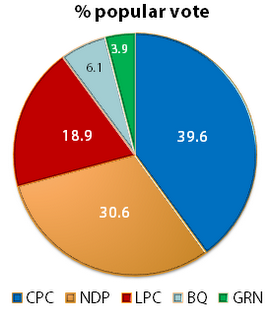Besides the fact that this majority government represents a minority of the electorate, it is also an anomaly of a split vote on the left, most especially in the Greater Toronto Area. This is another way of confirming that most voters were looking for a way not to vote for the Conservatives.
Don’t let lazy reporting or even lazier punditry obscure the facts: a large majority of Canadians — just over 60% — voted to the left of the Harper Conservatives.
Thomas Walkom explains:
For Canadians unnerved about a Stephen Harper majority government, two facts about Monday’s election stand out.
The first is that virtually all of the Conservative gains occurred in and around Toronto. Of the 24 new seats Harper won across Canada, 18 came from the Greater Toronto Area — including nine from Toronto itself.
Or, to put it another way, Harper owes his majority to the voters of the GTA. His gains elsewhere were minimal. In fact, the Conservatives lost seats in both Quebec and British Columbia.
The second notable fact is that most of these GTA gains resulted from vote splitting between Liberals and New Democrats — vote splitting that, ironically, was fuelled by a last minute surge of support toward Jack Layton’s NDP.
In Toronto’s Don Valley West, for instance, the NDP won 1,182 more votes than it had in 2008 — just enough to deny victory to Liberal incumbent Rob Oliphant.
This NDP vote increase occurred even though the party’s candidate, Nicole Yovanoff, spent virtually no time in the riding, instead flying off to Kenora to manage another New Democrat’s campaign.
Conservative gains resulting from vote-splitting also occurred in suburban ridings outside Toronto like Bramalea-Gore-Malton that, until Monday, had been Liberal strongholds.
All of which is to say that pressure will be redoubled on both Liberals and New Democrats to unite the so-called left.
As to that last point, yes, it may be time. The left must unite so that it can do what most Canadians want them to do, and that is to govern.


I don’t usually disagree with the editorial content on this site, but I have to in this case. Harper’s win is perfectly legitmate. This idea that we can lump together 60% of the vote even though it is split among 4 parties in order to say that Harper didn’t really win or that his win is not legitimate, is not even wrong, it is just muddled. Part of the intentions of the NDP is to destroy the Liberal party, even at the expense of keeping a far right wing PM in power. An NDP vote is not a generic progressive vote any more than a Liberal vote is. These are separate parties with very different bases and very different policies. They only seem to be somehow equivalent because we take for granted the mental image of politics as all existing on a one dimensional left-right axis. It doesn’t. Harper got the most votes and the most seats. He gets to make the decisions. If the 60% of people who voted against him could find enough common ground to govern, they could also find enough common ground to merge into one party, but they can’t.
I’m not questioning the legitimacy of this government, Clayton. I know — and have acknowledged — that majority governments typically represent a minority of the electorate. But whatever else the results signify, there continues to be a left-right political spectrum, and that fact is particularly highlighted in this instance by a Conservative party so far to the right that it can be fairly called corporatist: authoritarian, intrusive, militant and military, disdainful of the law, and serving the needs of a plutocratic elite. So, on the right, there are tax cuts to corporations, jet fighters, superprisons, and “fiscally responsible” cuts to social spending. On the left, accordingly, there is support for and expansion of social programs, cancelled corporate tax cuts, no jets, no jails.
All I have said is that a solid majority of Canadians voted against the Conservatives — just over 60% in a highly polarized political atmosphere created by the Conservatives themselves — and did so in such a way to indicate a sudden, significant, even unprecedented, shift to the left. In fact, the irony is that this shift in places like Toronto — where traditional Liberal voters cast ballots for the surging NDP — is what delivered the Conservatives their majority. As I have also said, we respect the results of the election, we accept that we’re on a Westminster model with a first-past-the-post method of election, but we are not required to pretend that they are fully representative of the will of the people. Speaking up, speaking out, clarifying our expectations, rallying our hopes: those are all a part of the democratic process too. Harper called for a majority. It was in fact about the only thing in his platform. He got that majority in large part by poisoning the political discourse with smear campaigns and attack ads. And so we are left to consider just what the majority means and what it really represents. We accept the fact of it. But we are not expected to accept it uncritically. And reminding ourselves that a majority government is not the same as majority representation is a way to assure ourselves of what the democratic process requires of us beyond the confines of an election campaign.